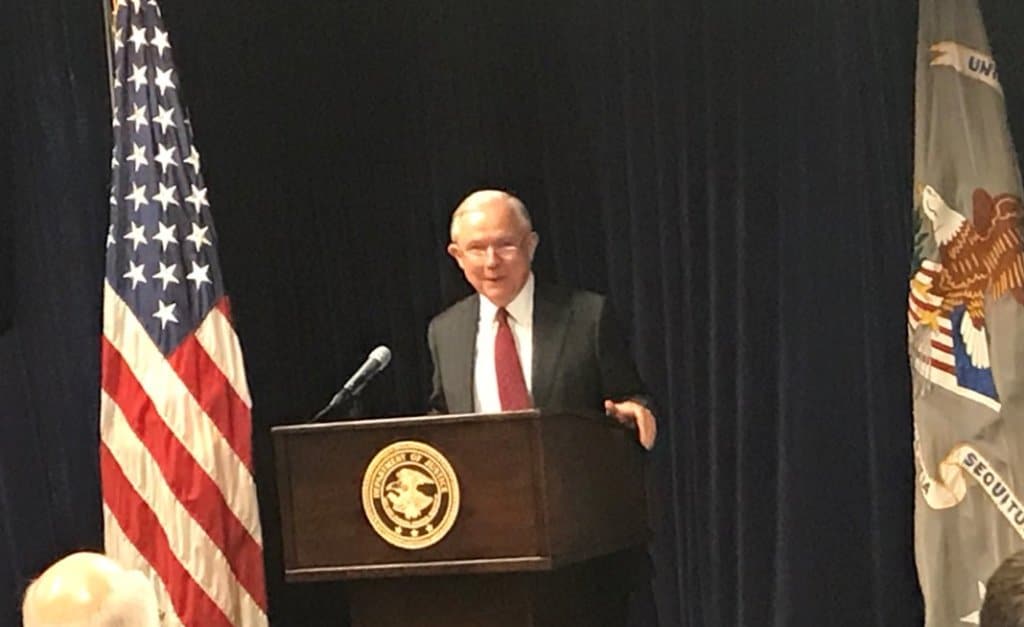In an attempt to speed up the process of deportation of illegal immigrants, U.S. Attorney General Jeff Sessions issued an order on Aug.16, asking judges to delay cases only “for good cause shown.”
Session’s interim order, which has been criticized by many in the judicial fraternity, mentions that a deportation case should only be postponed if it shows a “good cause,” that is, if a person is likely to succeed in efforts to remain in the United States, either by appealing for asylum or receiving some form of visa or work permit, Reuters reported. The “good cause” standard “limits the discretion of immigration judges and prohibits them from granting continuances for any reason or no reason at all,” he added, according to the report.
Sessions’ recent order was called “troubling” by Stephen Kang, an attorney with the ACLU immigrants rights project, the news agency reported. The move is one of a series that has “moved in the direction of restricting due process rights for individuals who are in removal proceedings,” the report quoted Kang as saying.
Immigration cases, he added, are complex as people require time to get lawyers and ensure that their cases get a fair hearing.
The U.S. Justice Department has been struggling with thousands of pending cases in immigration courts. Over 700,000 cases were lying open as of May, according to an earlier CNN report.
Department spokesman Devin O’Malley said that even after hiring more immigration judges, “unnecessary and improper continuances … continue to plague the immigration court system and contribute to the backlog,” the Reuters report added.
In his order, Session said that the “use of continuances as a dilatory tactic is particularly pernicious in the immigration context” because illegal residents in the country would want to delay their deportation for as long as possible.
The need to show a good cause for continuation of the case would work as an “important check on immigration judges’ authority” and demonstrate public interest in “expeditious enforcement of the immigration laws,” Reuters cited him saying.
Session’s order comes even as a union of immigration judges submitted a formal grievance against the Justice Department before a Philadelphia-based judge earlier this month, accusing the attorney general of dictating the outcome in an immigration case.
Sessions was accused of using his power directly in an immigrant deportation case, which was under Judge Steven Morley’s jurisdiction, in May this year. In the said incident, the judge ordered the administration to take more time in finding Reynaldo Castro-Tum, a Guatemalan accused of entering the United States illegally in 2014 as a 17-year-old, who had missed several court hearings. The judge said that the administration may not have his correct address, and thus could take more time.
Sessions overruled Morley’s decision and issued an order dictating the immigrant to show up for the hearing, scheduled on May 31 failing which he would be deported. Sessions also ordered Morley to make his decision within 14 days, and when Morley further delayed, the concerned case was passed to another judge. About 80 other cases were pulled out of Morley’s jurisdiction.
Ashley Tabaddor, a Los Angeles-based immigration judge and president of the National Association of Immigration Judges, said that the decision to withdraw the cases from Morley’s jurisdiction was a “clear attempt” to pressurize judges to act in accordance with prosecutors of the justice department, who want to issue deportation orders as quickly as possible, USA Today reported.
Castro-Tum was finally ordered to be deported in July “in absentia,” meaning he was not present for the hearing.
Sessions has been accused of supporting U.S. President Donald Trump’s anti-immigration policy and acting as an architect of the “zero tolerance policy,” under which immigrants entering the country illegally can be prosecuted.
